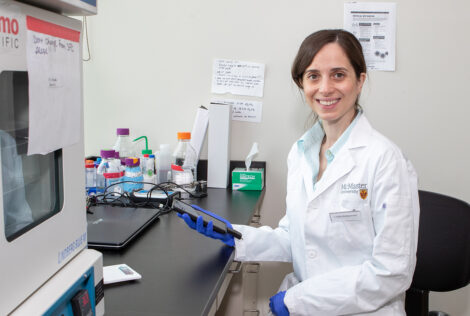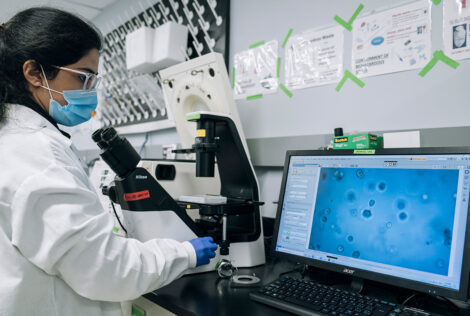

McMaster Engineering grads, Michael Takla, Rotimi Fadiya, Prateek Mathur and Shivad Bhavsar knew the James Dyson Award announcement would be big news. What they didn’t expect was a fan club.
“While Rotimi and I were walking through downtown Toronto were stopped by a woman who asked for our picture because she saw us on the news,” Takla said. “Every five minutes that day we found another article, journal, tweet or Facebook post that mentioned something about us. It was crazy.”
The Electrical and Biomedical Engineering alumni recently accepted the prestigious international award and $50K to support the development of The sKan, the team’s skin cancer detection device. The sKan assists physicians and the average person in detecting melanoma by creating a thermal map on the region of interest on the skin.
The news travelled around the world and was featured in more than 150 publications, including The Guardian, CBC National, Toronto Star, and BBC News and went viral on social media with hundreds of posts.
“I’m still processing the experience, said Fadiya. “The outpouring of congratulations that we received from family, friends and the McMaster Engineering community was beyond belief. It was a bit overwhelming but truly a once in a lifetime experience that I will never forget.”
The group was also moved by messages from melanoma survivors who recounted their stories and offered support and gratitude for their work.
“One individual who had been diagnosed with melanoma and had gotten treated successfully, offered to be a test subject for any trials,” said Bhavsar. “Unfortunately, we are not at that stage yet, but it was so wonderful to see support from someone directly affected by the problem we hope to solve.”
Some of the best feedback has been words of encouragement from influential figures in the medical space. It has given us the motivation to carry on and show these opinion leaders that our device is legit.
PRSM Medical, the team’s startup company, will continue to work with The Forge, Hamilton’s student incubator and McMaster University’s on-campus entrepreneurship initiative, to further develop the sKan.
They hope to improve the device’s sensitivity and resolution to detect smaller lesions with an increased number of thermistors. Thermistors are temperature-sensitive components that look for areas of significant temperature difference on the skin, which may indicate risk of melanoma. The team aims to have a new prototype ready for testing in 6-8 months.
The ultimate goal for the group is to see the sKan used as a standard method of testing for the early detection of melanoma in every family physician’s office.
“We believe it will help many medical professionals with the melanoma diagnosis process, especially those with limited experience with using the standard visual metrics,” explained Bhavsar. “The cost of biopsies is a significant burden to the healthcare system, so I can also see our device reducing this considerably.”


